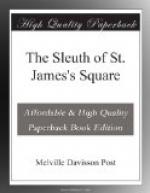Giovanni wrote a letter to the State Department when he learned what had happened to Rodman. The State Department turned it over to the court at the trial. I think it was one of the things that influenced the judge in his decision. Still, at the time, there seemed no other reasonable decision to make. The testimony must have appeared incredible; it must have appeared fantastic. No man reading the record could have come to any other conclusion about it. Yet it seemed impossible — at least, it seemed impossible for me — to consider this great vital bulk of a man as a monk of one of the oldest religious orders in the world. Every common, academic conception of such a monk he distinctly negatived. He impressed me, instead, as possessing the ultimate qualities of clever diplomacy — the subtle ambassador of some new Oriental power, shrewd, suave, accomplished.
When one read the yellow-backed court-record, the sense of old, obscure, mysterious agencies moving in sinister menace, invisibly, around Rodman could not be escaped from. You believed it. Against your reason, against all modern experience of life, you believed it.
And yet it could not be true! One had to find that verdict or topple over all human knowledge — that is, all human knowledge as we understand it. The judge, cutting short the criminal trial, took the only way out of the thing.
There was one man in the world that everybody wished could have been present at the time. That was Sir Henry Marquis. Marquis was chief of the Criminal Investigation Department of Scotland Yard. He had been in charge of the English secret service on the frontier of the Shan states, and at the time he was in Asia.
As soon as Scotland Yard could release Sir Henry, it sent him. Rodman’s genius was the common property of the world. The American Government could not, even with the verdict of a trial court, let Rodman’s death go by under the smoke-screen of such a weird, inscrutable mystery.
I was to meet Sir Henry and come here with him. But my train into New England was delayed, and when I arrived at the station, I found that Marquis had gone down to have a look at Rodman’s country-house, where the thing had happened.
It was on an isolated forest ridge of the Berkshires, no human soul within a dozen miles of it — a comfortable stone house in the English fashion. There was a big drawing-room across one end of it, with an immense fireplace framed in black marble under a great white panel to the ceiling. It had a wide black-marble hearth. There is an excellent photograph of it in the record, showing the single andiron, that mysterious andiron upon which the whole tragedy seemed to turn as on a hinge.
Rodman used this drawing-room for a workshop. He kept it close-shuttered and locked. Not even this big, yellow, servile creature who took exclusive care of him in the house was allowed to enter, except under Rodman’s eye. What he saw in the final scenes of the tragedy, he saw looking in through a crack under the door. The earlier things he noticed when he put logs on the fire at dark.




